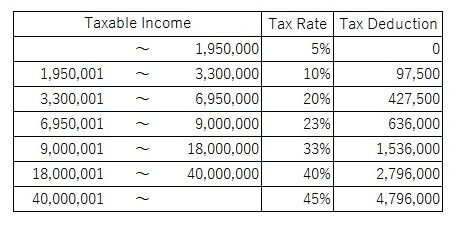
VAT on real estate transactions in Japan
Japanese consumption tax is sales based tax applied on supplies on certain goods and services within Japan, and it is similar to VAT/GST in AUS. The sale or lease of an asset located in Japan is a taxable transaction, however there are some transactions which are specifically excluded from being taxable, such as the sale or lease of land. The current consumption tax rate is 8%, and this will increase to 10% on 1 October 2019.
If you have an investment property in Japan, or use a property in running a business, there might be implications for income tax (including capital gains tax), consumption tax, and other related taxes. Japanese taxation can be difficult to handle especially for foreigners. Click here for more information about Japanese real estate taxation. The following will further explain Japanese consumption tax on real estate in Japan.
Buying a property in Japan
There is an increasing number of foreigners purchasing real estate here in Hakuba, Japan, ever since Hakuba became well-known for one of the greatest ski resorts in Asia. In the past, the most common investments are from Australia, but nowadays investments coming from Asia, such as China, Taiwan, Singapore are rapidly increasing.
The sale of land is excluded from being taxable for consumption tax purposes, however, when you buy a house or flat, or when build, it is subject to consumption tax.
For example:
Price of a house:JPY40,000,00
Consumption tax :JPY3,200,000 (JPY40,000,000×8%)
Commission to an agent:JPY1,200,000
Consumption tax: JPY96,000(JPY1,200,000×8%)
Rent out a property in Japan
Some of foreign investors acquire a property for investment purposes, and such non-resident owners consider leasing their properties. Also, non-Japanese living in Japan look for ski resorts as investment opportunities, or purchase properties as their second home. Such Japanese resident owners may consider leasing their properties during their absence as well.
When you rent out a property, the following transactions are non-taxable for cumsumption tax purposes:
-Leases of land
-Rental of housing (residential purpose)
If you rent out a property for residential purposes, you should not receive consumption tax from lessee. If you receive rental income from a rental cottage, flat, hotel, office tenant etc., it is subject to consumption tax.
In principle, consumption taxpayer status is determined depending on the amount of domestic taxable sales in the past. If your domestic taxable sales is over JPY10M a year, you are required to file a consumption tax return to the tax office. The amount of consumption tax payable is calculated based on the net of (i) consumption tax received on domestic taxable sales minus (ii) consumption tax suffered on domestic taxable purchase. There is a possibility that you will receive a consumption tax refund if the purchase price is high.
The taxable period is the respective fiscal year for a corporate taxable person, and the calendar year for an individual taxable person. If you need more information regarding your tax obligation in Japan, please feel free to contact us. If you need our tax advice before asking tax preparation services, we would be glad to offer an e-mail consultation.

Japanese tax on rental income – about withholding tax and tax returns
Recently, the number of investors who purchase properties in Japan is rapidly increasing, since Tokyo will host the Olympic Games in 2020 and investors have a high expectation for it. Also, the number of foreign visitors are sharply increasing and they enjoy the Japanese culture during their stay. Some foreign visitors go to ski resorts like Niseko and Hakuba, which are renowned for its consistency and quality of powder snow throughout the winter, and investors regard such resort areas as invest opportunities as well. In this article, we will explain Japanese taxation related to investments to properties.
What is your taxpayer status in Japan?
Your Japanese resident status affects whether or not you need to pay tax in Japan on your foreign income. Non-residents only pay tax on their Japanese income – they don’t pay Japanese tax on their foreign income. Residents normally pay Japanese tax on all their worldwide income, so it is whether it’s from Japan or abroad.
Whether you are Japanese resident usually depends on several factors, such as how many days you spend in Japan, your address, your job, situation of your family, nationality, visa status, etc. Your resident status should be determined comprehensively. Click here for more information of taxpayer status.
Purchasing real estate in Japan
There is an increasing number of foreigners purchasing real estate here in Hakuba, Japan, ever since Hakuba became well-known for one of the greatest ski resorts in Asia. In the past, the most common investments are from Australia, but nowadays investments coming from Asia, such as China, Taiwan, Singapore are rapidly increasing. Some of them acquire a property for investment purposes and such non-resident owners consider leasing their properties.
Needless to say, non-Japanese living in Japan look for Hakuba/Niseko as investment opportunities, or purchase properties as their second home. Such Japanese resident owners may consider leasing their properties during their absence as well.
How to calculate profits on rental income
You may have to pay Japanese income tax even if your taxpayer status is non-resident, in case you rent out a property and your gains are above the tax-free allowance. Please be aware that for properties owned by a company, rental income should be treated as the same way as any other income from its business.
Rental income includes:
・Rent
・Key money
・Contract renewal fees
You must pay income tax on the profit you make from renting out the property, after deductions for “allowable expenses”. Allowable expenses are things you need to spend money on the day-to-day running of the property.
Costs you can claim to reduce tax:
・letting agents’ fees
・legal fees
・accountants’ fees
・buildings and contents insurance
・maintenance and repairs to the property (but not improvements)
・utility bills, like gas, water and electricity
・property tax
・services you pay for, like cleaning or gardening
・other direct costs of letting the property, like phone calls, stationery and advertising
Allowable expenses don’t include “capital expenditure” – like renovating it beyond repairs. Such costs should be depreciated over useful lives as fixed assets, and the depreciation costs will be treated as deductible expenses each year.
Withholding tax and tax returns for non-resident owners
If the tenant of your property is a company (e.g. a company renting the apartment for their employee), the tenant must withhold 20.42% of the monthly rent and pay it to the tax office by the 10th day of the following month. If the withholding tax paid is higher than the amount liable, the excess can be refunded. It means that if your property business is in deficit, you don’t need to pay tax and you can claim a tax refund. (Maintenance costs or depreciation expenses tend to be large for property business, and income tax can be often refunded.)
In that case, you will need to appoint a tax agent in Japan to file a tax return on your behalf to the tax office. We offer these services online, so even if you are an overseas resident, we can provide tax preparation services. Click here for more information about our taxation services. Please note that even if you cannot receive a refund, you have to file tax returns to the tax office, when taxable gains are above the tax-free allowance.
If an individual leases your property for residential purposes, he/she is not required to withhold any rent. However, even if your taxpayer status is non-resident and there’s no withholding tax, you are still subject to aggregate taxation and need to pay tax, when taxable gains are above the tax-free allowance. In that case, you will need to appoint a tax agent in Japan to file a tax return on your behalf to the tax office each year.

Overview of Japanese taxation for individuals
Individual income tax in Japan consists of national income tax and local inhabitant tax. The taxable year of individual income tax is the calendar year, while local inhabitant tax is assessed on individuals who live in Japan as of 1 January. Inhabitant tax is calculated based on income for the preceding year.
Individuals who sell and acquire goods and services in Japan will suffer consumption tax on those transactions. In principle, consumption taxpayer status is determined depending on the amount of domestic taxable sales in the past. Japanese consumption tax is sales based tax and is similar to VAT/GST.
Classification of individual taxpayers
There are two categories of individual taxpayers – Resident or non-resident. Below is the definition.
Resident:
Residents are divided to either permanent resident or non-permanent resident.
A non-permanent resident is an individual who doesn’t have Japanese nationality and has lived in Japan for 5 years or less in the last 10 years.
A permanent resident is an individual other than a non-permanent resident, i.e. an individual who has Japanese nationality, or has lived in Japan for more than 5 years in the last 10 years. Permanent resident is subject to Japanese income taxes on worldwide income.
Non-resident:
A non-resident is an individual other than a resident. Basically, an individual who does not have an address in Japan and has lived in Japan for less than 1 year.
Short term visitors
Generally, Japan’s double tax treaties are in line with OECD model treaty regarding the treatment of tax exempt foreign employees temporally working in Japan. Such employees are generally tax-exempt if they meet the following 3 criteria:
・They are present in Japan for less than 183 days in any 12 month period
・Their salary is paid by a non-resident employer
・There aren’t any salary paid by a permanent establishment (PE) in Japan
This criteria depends on each country’s tax treaty, so please refer to the double tax treaty of your country.
Tax rate
Japanese income tax use the progressive tax rate. The following rates are applied to the income (revenue-expenses) minus allowable tax deductions. (2015~)
National income tax rate

Example
If your taxable income is JPY7,000,000, income tax amount is following:
7,000,000×0.23-636,000=974,000
Local tax rate
Local tax consists of two categories – per capita levy and income-based levy. Per capita tax is around JPY5,000/year depending on each municipal government. Inhabitant tax rate is 10%, regardless of the amount of taxable income. A non-resident is generally not liable for inhabitant tax, however if a non-resident is registered in the municipal government and lives in Japan as of 1 January, the individual may be liable for inhabitant tax.
Generally, inhabitant tax returns are not required to be filed since the information necessary for assessment is submitted by your employer or by filing income tax returns.